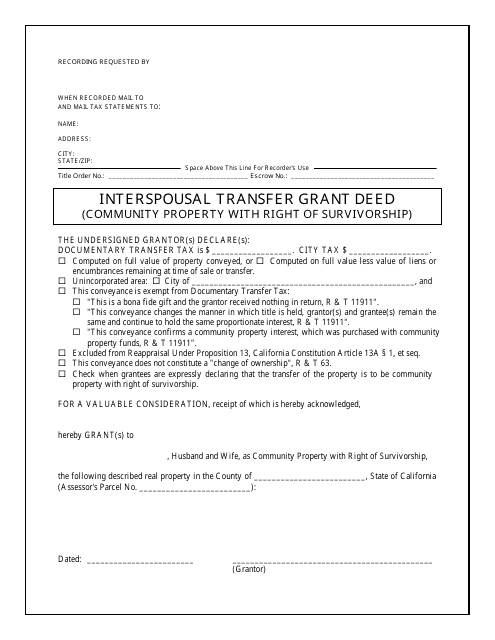Interspousal Transfer Grant Deed Form (Community Property With Right of Survivorship) - California
The Interspousal Transfer Grant Deed Form (Community Property With Right of Survivorship) in California is used to transfer property between spouses while preserving the community property ownership and the right of survivorship. This form allows spouses to transfer real estate to one another without triggering reassessment for property tax purposes.
In California, the interspousal transfer grant deed form (community property with right of survivorship) is typically filed by both spouses who are transferring the property.
FAQ
Q: What is an Interspousal Transfer Grant Deed?
A: An Interspousal Transfer Grant Deed is a legal document used in California to transfer real property between spouses.
Q: What is Community Property With Right of Survivorship?
A: Community Property With Right of Survivorship is a form of joint ownership in which a property is owned by both spouses, and in the event of one spouse's death, the property automatically transfers to the surviving spouse.
Q: When should I use an Interspousal Transfer Grant Deed?
A: You should use an Interspousal Transfer Grant Deed when transferring real property between spouses in California.
Q: Do I need a lawyer to fill out an Interspousal Transfer Grant Deed?
A: While it is not required, it is recommended to seek the assistance of a lawyer or legal professional to ensure the proper completion and execution of the deed.
Q: Are there any fees associated with filing an Interspousal Transfer Grant Deed?
A: Yes, there are usually filing fees associated with the recording of the deed in the county where the property is located.
Q: Can an Interspousal Transfer Grant Deed be revoked?
A: Yes, an Interspousal Transfer Grant Deed can be revoked by executing a new deed or by divorce or legal separation agreement.
Q: Is an Interspousal Transfer Grant Deed valid in all states?
A: No, an Interspousal Transfer Grant Deed is typically specific to California and may not be valid in other states.
Q: What happens to the property if both spouses die?
A: If both spouses die, the property would typically pass according to their wills or the laws of intestate succession.





